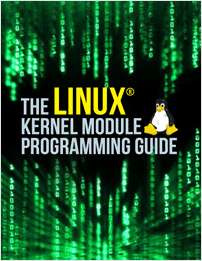
|
FreeComputerBooks.com
Links to Free Computer, Mathematics, Technical Books all over the World
|
|
- Title The Linux Kernel Module Programming Guide
- Author(s) Peter Jay Salzman, Michael Burian, Ori Pomerantz, Bob Mottram, Jim Huang
- Publisher: Iuniverse Inc (August 1, 2000); eBook (Open Software Licensed, 2025)
- License(s): Open Software License, version 3.0.
- Hardcover/Paperback: 132 pages
- eBook: HTML and PDF
- Language: English
- ISBN-10: 0595100422
- ISBN-13: 978-0595100422
- Share This:

|
This book is an excellent guide for people who want to write kernel modules. It takes a hands-on approach starting with writing a small "hello, world" program, and quickly moves from there. Far from a boring text on programming, Linux Kernel Module Programming Guide has a lively style that entertains while it educates.
No distribution can provide a Linux kernel that meets all users'needs. Computers big and small have special requirements that requirereconfiguring and rebuilding the kernel. Whether you are trying toget sound, wireless support, and power management working on a laptopor incorporating enterprise features such as logical volume managementon a large server, you can benefit from the insights in this book.
About the Authors- Peter Jay Salzman was a computer hacker and former senior member of the hacking group, Legion of Doom, in the 1980s.
- Unix/Linux Programming - System and Applications
- The Linux Operating Systems
- Unix and Linux System Administration
- Assembly and Machine Languages Programming

- The Linux Kernel Module Programming Guide (Peter Jay Salzman, et al)
- The Mirror Site (1) - PDF
- Linux Kernel Development (Robert Love)
- Understanding the Linux Kernel: From I/O Ports to Process (Daniel P. Bovet)
-
 O'Reilly® Linux Kernel in a Nutshell (Greg Kroah-Hartman)
O'Reilly® Linux Kernel in a Nutshell (Greg Kroah-Hartman)
Written by a leading developer and maintainer of the Linux kernel,this book is a comprehensive overview of kernel configuration and building, a critical task for Linux users and administrators.
-
 Linux Kernel Programming: Device Drivers and Synchronization
Linux Kernel Programming: Device Drivers and Synchronization
Discover how to write high-quality character driver code, interface with userspace, work with chip memory, and gain an in-depth understanding of working with hardware interrupts and kernel synchronization.
-
 O'Reilly® Linux Device Drivers, 3rd Edition (Jonathan Corbet)
O'Reilly® Linux Device Drivers, 3rd Edition (Jonathan Corbet)
The 3rd edition of Linux Device Drivers is better than ever. The book covers all the significant changes to Version 2.6 of the Linux kernel, which simplifies many activities, and contains subtle new features.
-
 Linux Inside (0xAX)
Linux Inside (0xAX)
This is a book about the linux kernel and its insides. The goal to share modest knowledge about the insides of the linux kernel and help people who are interested in linux kernel insides, and other low-level subject matter.
-
 Linux Kernel Crash Book (Igor Ljubuncic)
Linux Kernel Crash Book (Igor Ljubuncic)
For systems and network administrators and technical support engineers responsible for maintaining Linux systems and networks, this is a first aid guide, it provides quick solutions to a variety of Linux system and network problems.
-
 O'Reilly® Linux Device Drivers, 2nd Edition (Alessandro Rubini)
O'Reilly® Linux Device Drivers, 2nd Edition (Alessandro Rubini)
This book is for anyone who wants to support computer peripherals under the Linux operating system or who wants to develop new hardware and run it under Linux. It provides insights into address spaces, asynchronous events, and I/O.
-
 Advanced Linux Programming (Mark L. Mitchell, et al)
Advanced Linux Programming (Mark L. Mitchell, et al)
This book focuses mostly on the Application Programming Interface (API) provided by the Linux kernel and the C library. It contains a preliminary introduction to the development tools available.
-
 An Introduction to GCC: for the GNU Compilers GCC and G++
An Introduction to GCC: for the GNU Compilers GCC and G++
This book provides a complete tutorial introduction to the GNU C/C++ compilers, gcc and g++. GCC is the defacto compiler collection for hundreds of thousands of open source and commercial projects worldwide, and is the standard compiler for academic programs.
-
 O'Reilly® UNIX Systems Programming for SVR4 (David A. Curry)
O'Reilly® UNIX Systems Programming for SVR4 (David A. Curry)
This book gives you the nitty-gritty details on how UNIX interacts with applications. If you're writing an application from scratch, or if you're porting an application to any System V Release 4 (SVR4) platform, you need this book.
-
 Unix System Programming in OCaml (Xavier Leroy, et al)
Unix System Programming in OCaml (Xavier Leroy, et al)
This book is an introductory course on Unix system programming, with an emphasis on communications between processes, using OCaml. This gives an unusual perspective on systems programming and on the ML language.
-
 O'Reilly® Using C on the UNIX System (David A. Curry)
O'Reilly® Using C on the UNIX System (David A. Curry)
This book provides a thorough introduction to the UNIX system call libraries. It is aimed at programmers who already know C, but who want to take full advantage of the UNIX programming environment.
-
 The Art of UNIX Programming (Eric Steven Raymond)
The Art of UNIX Programming (Eric Steven Raymond)
This book attempts to capture the engineering wisdom and design philosophy of the UNIX, Linux, and Open Source software development community, and as it is applied today by the most experienced programmers.
-
 FreeBSD System Programming (Nathan Boeger, et al)
FreeBSD System Programming (Nathan Boeger, et al)
This book is intended as a resource to system programming on BSDs. The reader should be familiar with basic programming in C or C++. The information in this book might be aimed toward the beginning programmer - indeed, it could serve useful for the programmer unfamiliar with the FreeBSD platform.
|
:
|
|
 |
|
 |
|
 |
|
 |
|
 |
|
 |
|
 |
|
 |
|
 |
|
 |
|
 |
|
 |
|
 |
|
 |
|
 |
|
 |
|
 |
|



